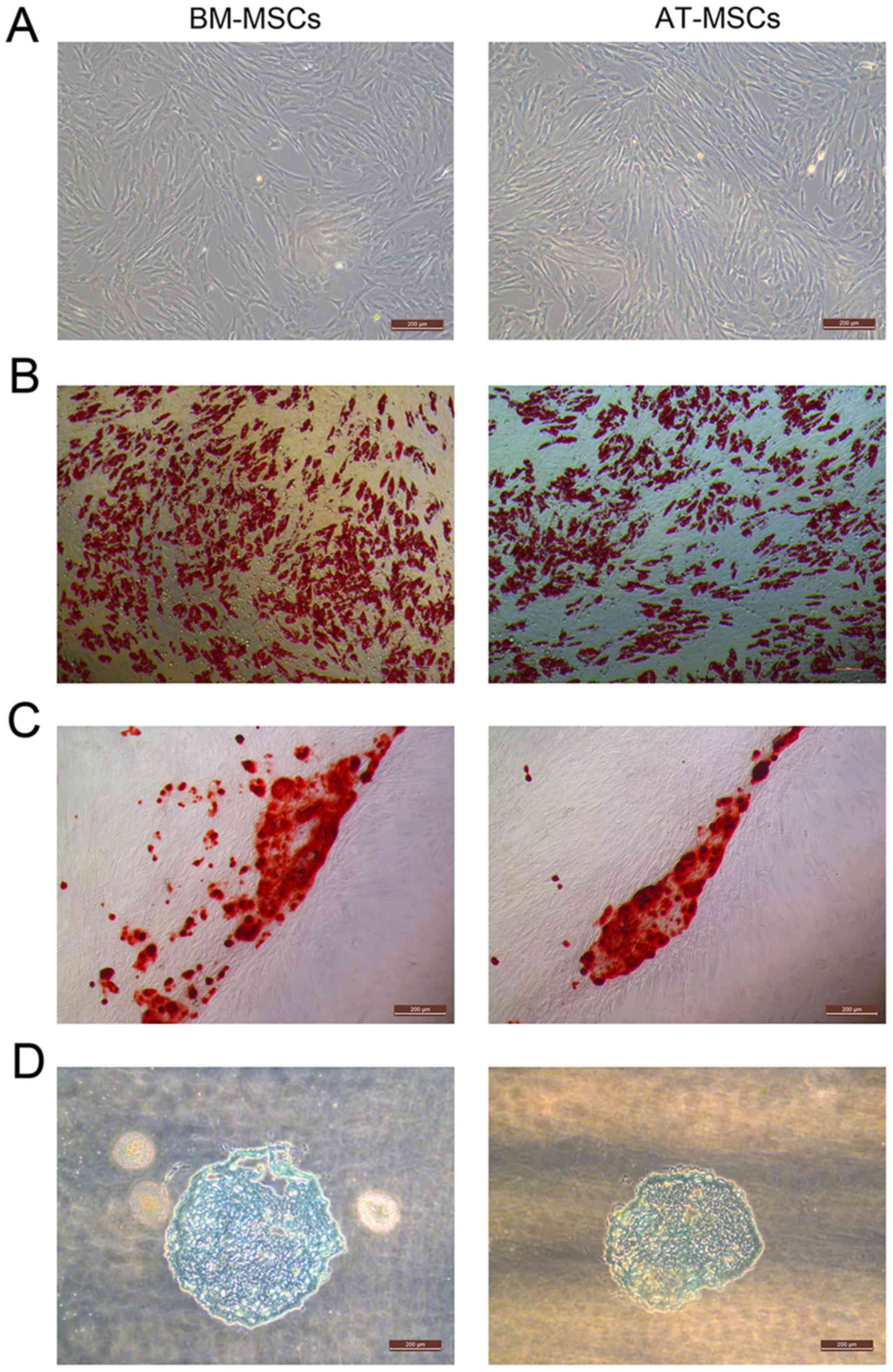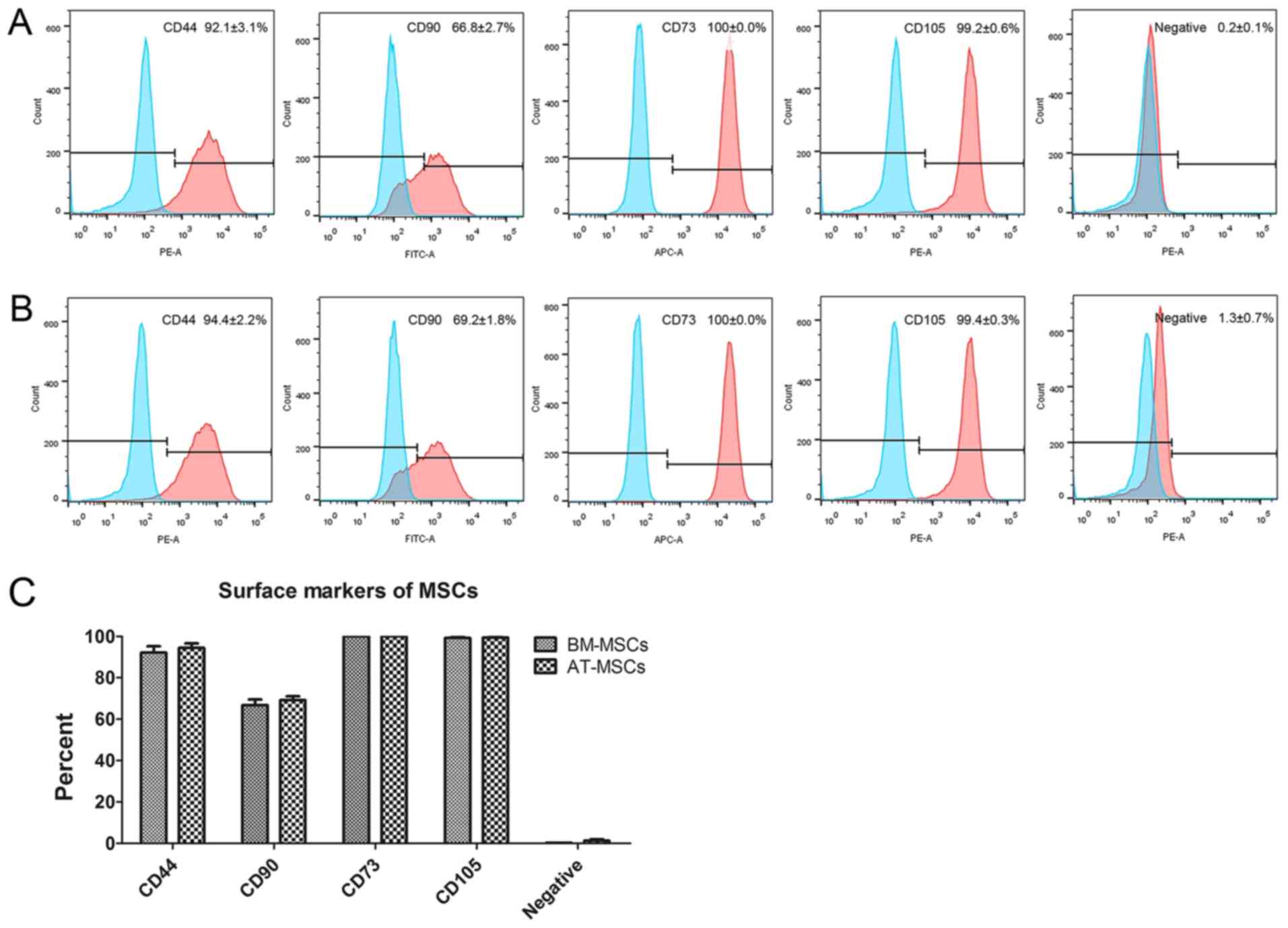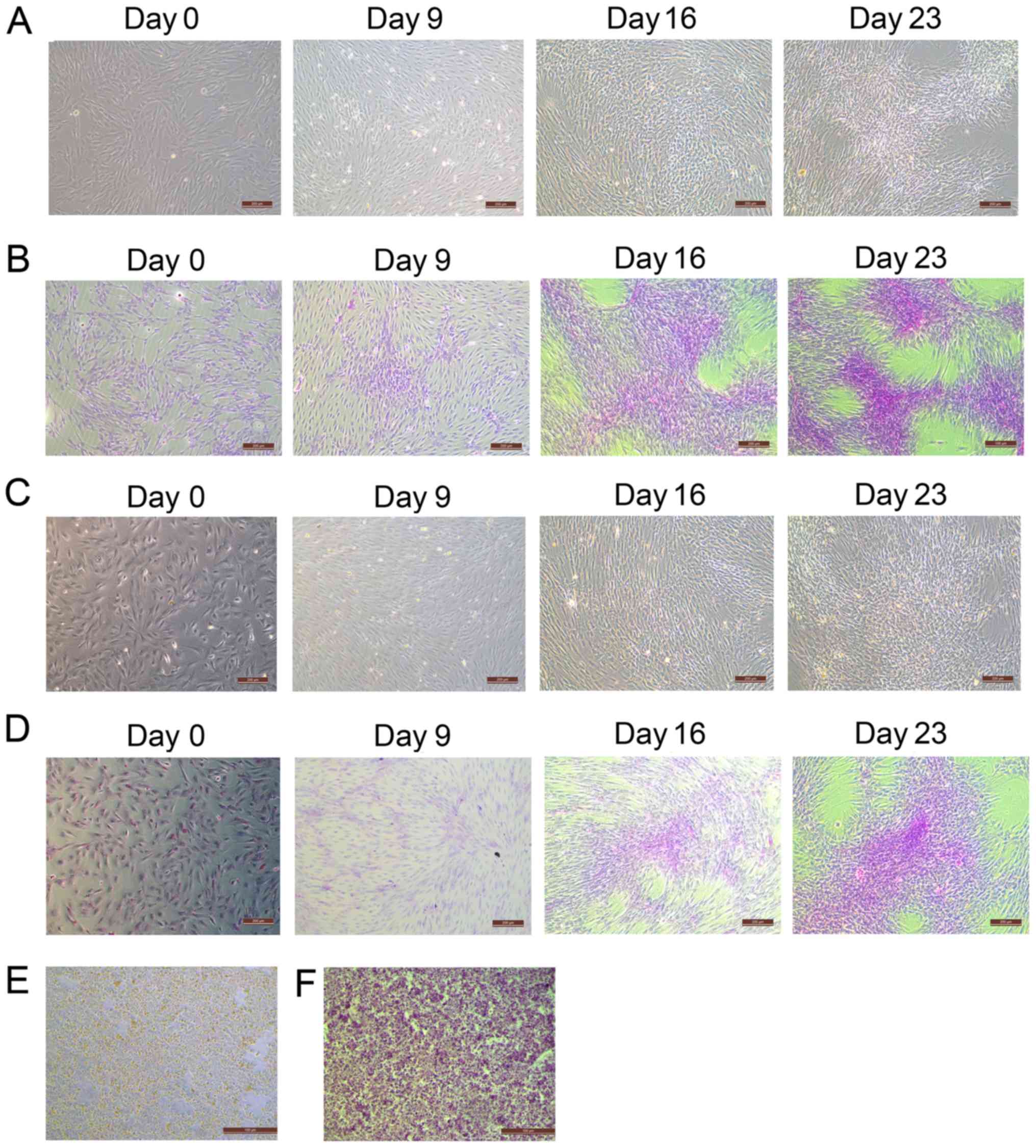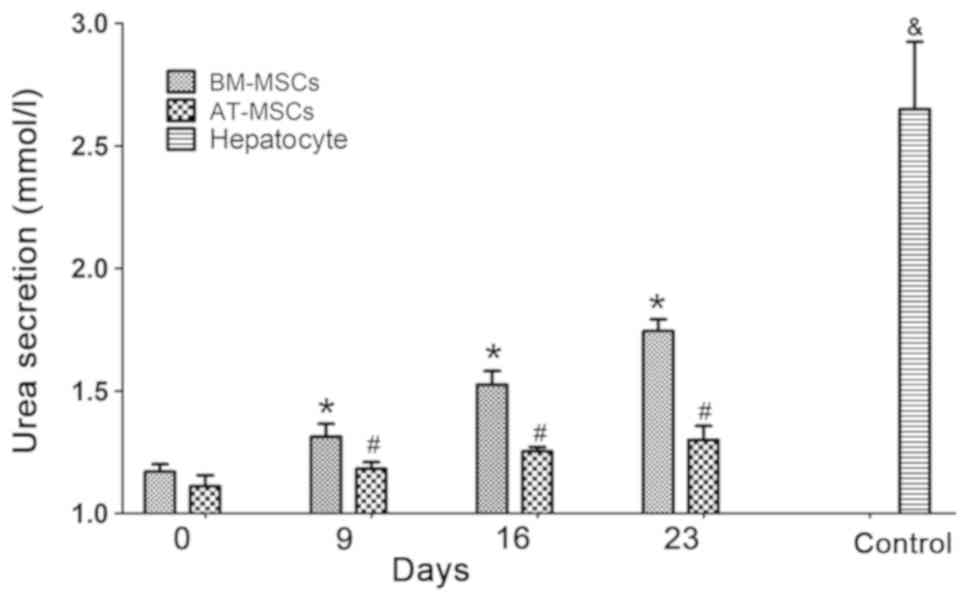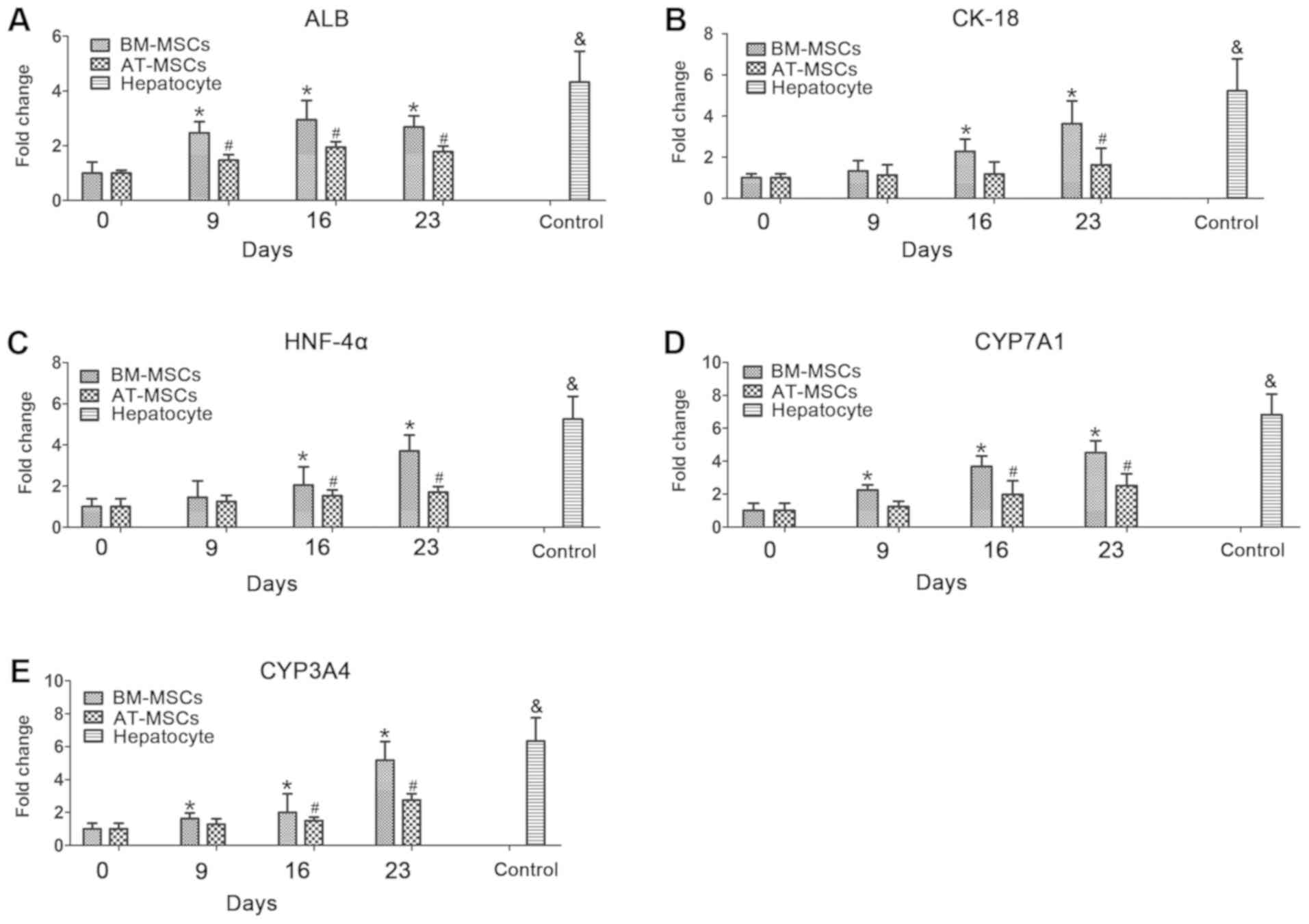|
1
|
Alfaifi M, Eom YW, Newsome PN and Baik SK:
Mesenchymal stromal cell therapy for liver diseases. J Hepatol.
68:1272–1285. 2018.PubMed/NCBI View Article : Google Scholar
|
|
2
|
Michalopoulos GK: Hepatostat: Liver
regeneration and normal liver tissue maintenance. Hepatology.
65:1384–1392. 2017.PubMed/NCBI View Article : Google Scholar
|
|
3
|
Jalan R, Yurdaydin C, Bajaj JS, Acharya
SK, Arroyo V, Lin HC, Gines P, Kim WR and Kamath PS: World
Gastroenterology Organization Working Party. Toward an improved
definition of acute-on-chronic liver failure. Gastroenterology.
147:4–10. 2014.PubMed/NCBI View Article : Google Scholar
|
|
4
|
Nasralla D, Coussios CC, Mergental H,
Akhtar MZ, Butler AJ, Ceresa CDL, Chiocchia V, Dutton SJ,
García-Valdecasas JC, Heaton N, et al: A randomized trial of
normothermic preservation in liver transplantation. Nature.
557:50–56. 2014.PubMed/NCBI View Article : Google Scholar
|
|
5
|
Yu Y, Fisher JE, Lillegard JB, Rodysill B,
Amiot B and Nyberg SL: Cell therapies for liver diseases. Liver
Transpl. 18:9–21. 2012.PubMed/NCBI View
Article : Google Scholar
|
|
6
|
Zhao L, Chen S, Shi X, Cao H and Li L: A
pooled analysis of mesenchymal stem cell-based therapy for liver
disease. Stem Cell Res Ther. 9(72)2018.PubMed/NCBI View Article : Google Scholar
|
|
7
|
Chen Y, Shao JZ, Xiang LX, Dong XJ and
Zhang GR: Mesenchymal stem cells: A promising candidate in
regenerative medicine. Int J Biochem Cell Biol. 40:815–820.
2008.PubMed/NCBI View Article : Google Scholar
|
|
8
|
Lv FJ, Tuan RS, Cheung KM and Leung VY:
Concise review: The surface markers and identity of human
mesenchymal stem cells. Stem Cells. 32:1408–1019. 2014.PubMed/NCBI View Article : Google Scholar
|
|
9
|
Fu X, Jiang B, Zheng B, Yan Y, Wang J,
Duan Y, Li S, Yan L, Wang H, Chen B, et al: Heterogenic
transplantation of bone marrow-derived rhesus macaque mesenchymal
stem cells ameliorates liver fibrosis induced by carbon
tetrachloride in mouse. Peer J. 6(e4336)2018.PubMed/NCBI View Article : Google Scholar
|
|
10
|
Marx C, Silveira MD and Beyer Nardi N:
Adipose-derived stem cells in veterinary medicine: Characterization
and therapeutic applications. Stem Cells Dev. 24:803–813.
2015.PubMed/NCBI View Article : Google Scholar
|
|
11
|
Shi D, Zhang J, Zhou Q, Xin J, Jiang J,
Jiang L, Wu T, Li J, Ding W, Li J, et al: Quantitative evaluation
of human bone mesenchymal stem cells rescuing fulminant hepatic
failure in pigs. Gut. 66:955–964. 2017.PubMed/NCBI View Article : Google Scholar
|
|
12
|
Vezzani B, Pierantozzi E and Sorrentino V:
Mesenchymal stem cells: From the perivascular environment to
clinical applications. Histol Histopathol. 7:1235–1246.
2018.PubMed/NCBI View Article : Google Scholar
|
|
13
|
Nicolas CT, Hickey RD, Chen HS, Mao SA,
Lopera Higuita M, Wang Y and Nyberg SL: Concise review: Liver
regenerative medicine: From hepatocyte transplantation to
bioartificial livers and bioengineered grafts. Stem Cells.
25:42–50. 2017.PubMed/NCBI View Article : Google Scholar
|
|
14
|
Barlow S, Brooke G, Chatterjee K, Price G,
Pelekanos R, Rossetti T, Doody M, Venter D, Pain S, Gilshenan K and
Atkinson K: Comparison of human placenta- and bone marrow-derived
multipotent mesenchymal stem cells. Stem Cells Dev. 17:1095–1107.
2008.PubMed/NCBI View Article : Google Scholar
|
|
15
|
Heo JS, Choi Y, Kim HS and Kim HO:
Comparison of molecular profiles of human mesenchymal stem cells
derived from bone marrow, umbilical cord blood, placenta and
adipose tissue. Int J Mol Med. 37:115–125. 2016.PubMed/NCBI View Article : Google Scholar
|
|
16
|
Strioga M, Viswanathan S, Darinskas A,
Slaby O and Michalek J: Same or not the same? Comparison of adipose
tissue-derived versus bone marrow-derived mesenchymal stem and
stromal cells. Stem Cells Dev. 21:2724–2752. 2012.PubMed/NCBI View Article : Google Scholar
|
|
17
|
Sgodda M, Aurich H, Kleist S, Aurich I,
König S, Dollinger MM, Fleig WE and Christ B: Hepatocyte
differentiation of mesenchymal stem cells from rat peritoneal
adipose tissue in vitro and in vivo. Exp Cell Res. 313:2875–2886.
2007.PubMed/NCBI View Article : Google Scholar
|
|
18
|
Oliver K, Awan T and Bayes M:
Single-versus multiple-site harvesting techniques for bone marrow
concentrate: Evaluation of aspirate quality and pain. Orthop J
Sports Med. 5(232596711772439)2017.PubMed/NCBI View Article : Google Scholar
|
|
19
|
Mizuno H, Tobita M and Uysal AC: Concise
review: Adipose-derived stem cells as a novel tool for future
regenerative medicine. Stem cells. 30:804–810. 2012.PubMed/NCBI View Article : Google Scholar
|
|
20
|
Aurich H, Sgodda M, Kaltwasser P, Vetter
M, Weise A, Liehr T, Brulport M, Hengstler JG, Dollinger MM, Fleig
WE and Christ B: Hepatocyte differentiation of mesenchymal stem
cells from human adipose tissue in vitro promotes hepatic
integration in vivo. Gut. 58:570–581. 2009.PubMed/NCBI View Article : Google Scholar
|
|
21
|
Sun J, Yuan Y, Qin H, Ying C, Liu W, Zhang
J, He Y and Liu Z: Serum from hepatectomized rats induces the
differentiation of adipose tissue mesenchymal stem cells into
hepatocyte-like cells and upregulates the expression of hepatocyte
growth factor and interleukin-6 in vitro. Int J Mol Med.
31:667–675. 2013.PubMed/NCBI View Article : Google Scholar
|
|
22
|
Xu LJ, Wang SF, Wang DQ, Ma LJ, Chen Z,
Chen QQ, Wang J and Yan L: Adipose-derived stromal cells resemble
bone marrow stromal cells in hepatocyte differentiation potential
in vitro and in vivo. World J Gastroenterol. 23:6973–6982.
2017.PubMed/NCBI View Article : Google Scholar
|
|
23
|
Pennington MR, Curtis TM, Divers TJ,
Wagner B, Ness SL, Tennant BC and Van de Walle GR: Equine
mesenchymal stromal cells from different sources efficiently
differentiate into hepatocyte-like cells. Tissue Eng Part C
Methods. 22:596–607. 2016.PubMed/NCBI View Article : Google Scholar
|
|
24
|
Fu X, Yan Y, Li S, Wang J, Jiang B, Wang
H, Duan Y, Tan T, Gao F, Gong D, et al: Vitrification of rhesus
macaque mesenchymal stem cells and the effects on global gene
expression. Stem Cells Int. 2017(3893691)2017.PubMed/NCBI View Article : Google Scholar
|
|
25
|
Jiang B, Fu X, Yan L, Li S, Zhao D, Wang
X, Duan Y, Yan Y, Li E, Wu K, et al: Transplantation of human
ESC-derived mesenchymal stem cell spheroids ameliorates spontaneous
osteoarthritis in rhesus macaques. Theranostics. 9:6587–6600.
2019.PubMed/NCBI View Article : Google Scholar
|
|
26
|
Khanjani S, Khanmohammadi M, Zarnani AH,
Akhondi MM, Ahani A, Ghaempanah Z, Naderi MM, Eghtesad S and
Kazemnejad S: Comparative evaluation of differentiation potential
of menstrual blood- versus bone marrow-derived stem cells into
hepatocyte-like cells. PLoS One. 9(e86075)2014.PubMed/NCBI View Article : Google Scholar
|
|
27
|
Li Y, Wang Y, Wu Q, Li L, Shi Y, Bu H and
Bao J: Comparison of methods for isolating primary hepatocytes from
mini pigs. Xenotransplantation. 23:414–420. 2016.PubMed/NCBI View Article : Google Scholar
|
|
28
|
Sarvandi SS, Joghataei MT, Parivar K,
Khosravi M, Sarveazad A and Sanadgol N: In vitro differentiation of
rat mesenchymal stem cells to hepatocyte lineage. Iran J Basic Med
Sci. 18:89–97. 2015.PubMed/NCBI
|
|
29
|
Livak KJ and Schmittgen TD: Analysis of
relative gene expression data using real-time quantitative PCR and
the 2(Delta Delta C(T)) method. Methods. 25:402–408.
2001.PubMed/NCBI View Article : Google Scholar
|
|
30
|
Pournasr B, Mohamadnejad M, Bagheri M,
Aghdami N, Shahsavani M, Malekzadeh R and Baharvand H: In vitro
differentiation of human bone marrow mesenchymal stem cells into
hepatocyte-like cells. Arch Iran Med. 14:244–249. 2011.PubMed/NCBI
|
|
31
|
Al Battah F, De Kock J, Vanhaecke T and
Rogiers V: Current status of human adipose-derived stem cells:
Differentiation into hepatocyte-like cells. ScientificWorldJournal.
11:1568–1581. 2011.PubMed/NCBI View Article : Google Scholar
|
|
32
|
Yu J, Cao H, Yang J, Pan Q, Ma J, Li J, Li
Y, Li J, Wang Y and Li L: In vivo hepatic differentiation of
mesenchymal stem cells from human umbilical cord blood after
transplantation into mice with liver injury. Biochem Biophys Res
Commun. 422:539–545. 2012.PubMed/NCBI View Article : Google Scholar
|
|
33
|
Mou XZ, Lin J, Chen JY, Li YF, Wu XX,
Xiang BY, Li CY, Ma JM and Xiang C: Menstrual blood-derived
mesenchymal stem cells differentiate into functional
hepatocyte-like cells. J Zhejiang Univ Sci B. 14:961–972.
2013.PubMed/NCBI View Article : Google Scholar
|
|
34
|
Kwon A, Kim Y, Kim M, Kim J, Choi H,
Jekarl DW, Lee S, Kim JM, Shin JC and Park IY: Tissue-specific
differentiation potency of mesenchymal stromal cells from perinatal
tissues. Sci Rep. 6(23544)2016.PubMed/NCBI View Article : Google Scholar
|
|
35
|
Dominici M, Le Blanc K, Mueller I,
Slaper-Cortenbach I, Marini F, Krause D, Deans R, Keating A,
Prockop Dj and Horwitz E: Minimal criteria for defining multipotent
mesenchymal stromal cells. The International Society for Cellular
Therapy position statement. Cytotherapy. 8:315–317. 2006.PubMed/NCBI View Article : Google Scholar
|
|
36
|
Hu C and Li L: In vitro culture of
isolated primary hepatocytes and stem cell-derived hepatocyte-like
cells for liver regeneration. Protein Cell. 6:562–574.
2015.PubMed/NCBI View Article : Google Scholar
|
|
37
|
Shi X, Lv S, He X, Liu X, Sun M, Li M, Chi
G and Li Y: Differentiation of hepatocytes from induced pluripotent
stem cells derived from human hair follicle mesenchymal stem cells.
Cell Tissue Res. 366:1–11. 2016.PubMed/NCBI View Article : Google Scholar
|
|
38
|
Ayatollahi M, Soleimani M, Tabei SZ and
Kabir Salmani M: Hepatogenic differentiation of mesenchymal stem
cells induced by insulin like growth factor-1. World J Stem Cells.
3:113–121. 2011.PubMed/NCBI View Article : Google Scholar
|
|
39
|
Borhani-Haghighi M, Talaei-Khozani T,
Ayatollahi M and Vojdani Z: Wharton's jelly-derived mesenchymal
stem cells can differentiate into hepatocyte-like cells by hepg2
cell line extract. Iran J Med Sci. 40:143–151. 2015.PubMed/NCBI
|
|
40
|
Wang B, Li W, Dean D, Mishra MK and Wekesa
KS: Enhanced hepatogenic differentiation of bone marrow derived
mesenchymal stem cells on liver ECM hydrogel. J Biomed Mater Res A.
106:829–838. 2018.PubMed/NCBI View Article : Google Scholar
|
|
41
|
Zhang YN, Lie PC and Wei X:
Differentiation of mesenchymal stromal cells derived from umbilical
cord Wharton's jelly into hepatocyte-like cells. Cytotherapy.
11:548–558. 2009.PubMed/NCBI View Article : Google Scholar
|
|
42
|
Khanjani S, Khanmohammadi M, Zarnani AH,
Talebi S, Edalatkhah H, Eghtesad S, Nikokar I and Kazemnejad S:
Efficient generation of functional hepatocyte-like cells from
menstrual blood-derived stem cells. J Tissue Eng Regen Med.
9:E124–E134. 2015.PubMed/NCBI View Article : Google Scholar
|
|
43
|
Yang XF, Ren LW, Yang L, Deng CY and Li
FR: In vivo direct reprogramming of liver cells to insulin
producing cells by virus-free overexpression of defined factors.
Endocr J. 64:291–302. 2017.PubMed/NCBI View Article : Google Scholar
|
|
44
|
Sa-ngiamsuntorn K, Wongkajornsilp A,
Kasetsinsombat K, Duangsa-ard S, Nuntakarn L, Borwornpinyo S,
Akarasereenont P, Limsrichamrern S and Hongeng S: Upregulation of
CYP 450s expression of immortalized hepatocyte-like cells derived
from mesenchymal stem cells by enzyme inducers. BMC Biotechnol.
11(89)2011.PubMed/NCBI View Article : Google Scholar
|















